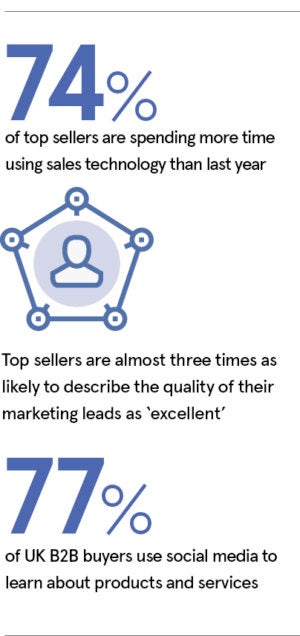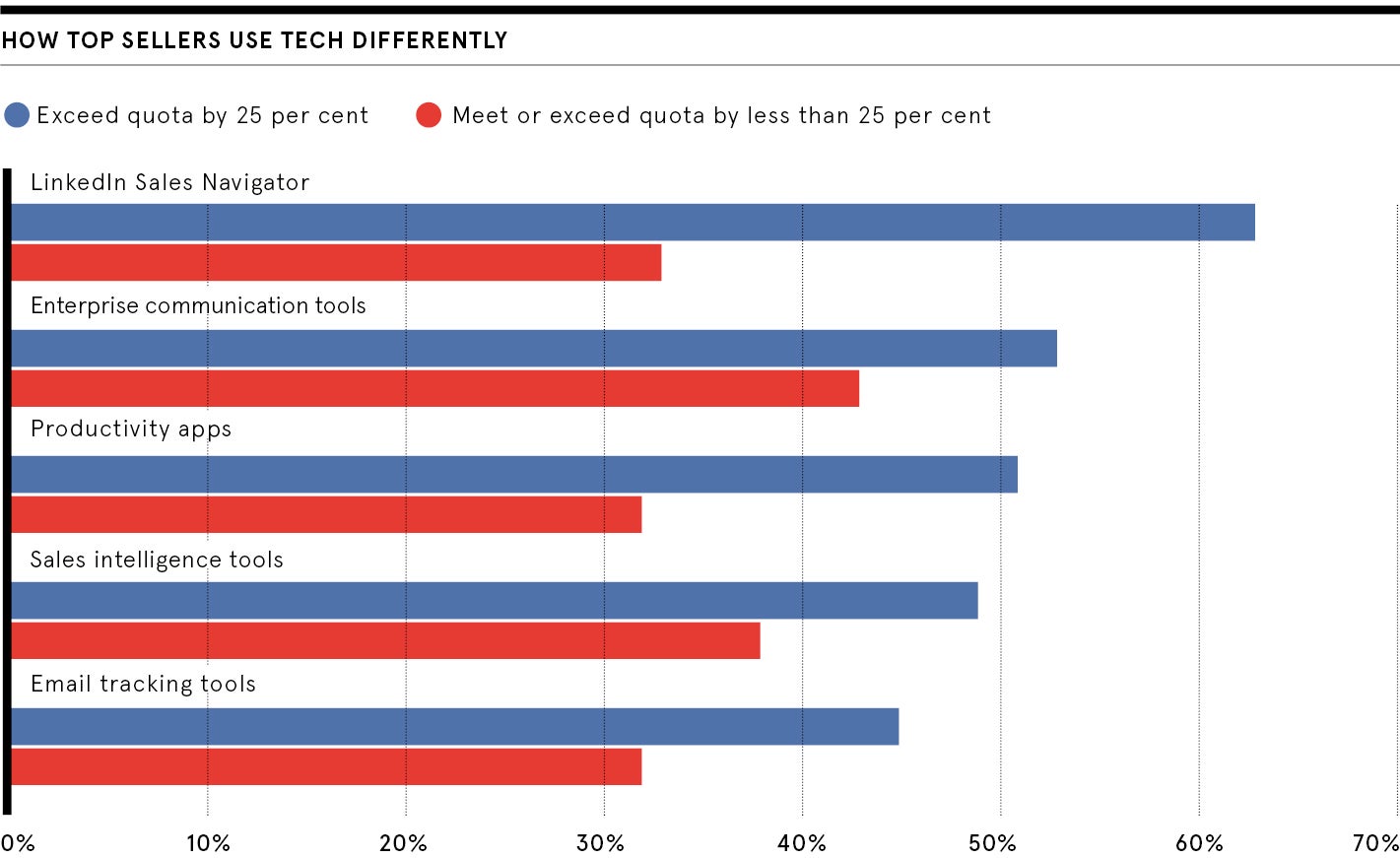The value of skilled sales people is more apparent today than ever.
LinkedIn data ranks persuasion as the second most sought-after soft skill throughout Europe, the Middle East and Africa, with sales leadership in the top ten most in-demand job-specific skills.
No matter how innovative or disruptive your business, its growth still depends on salespeople who can build trust, demonstrate value, negotiate effectively and close deals. The key question is what do these salespeople look like in 2019? What marks out top-performing sales teams from the rest?
LinkedIn’s annual State of Sales survey provides the answers. A key element of this research involves identifying the sales professionals who exceed their quota by 25 per cent or more, and then comparing their tactics, tools and techniques to those of peers who meet quota, but don’t outperform to the same degree. This analysis helps to illuminate the secrets of the most productive sales reps and the sales organisations behind them.
What drives top sales performance in the UK? Here are some of the key themes:
Top sellers earn trust while acknowledging price pressures
Sales professionals worldwide agree that trust is the most important factor helping them to close deals and top sales performers in the UK agree, with 33 per cent ranking trust as the most important factor. However, top sales professionals are also quick to acknowledge the price pressures that UK buyers are under in economically uncertain times, ranking price as more important than their peers in Europe. The value of trust often comes from the ability to make a case for a given price delivering ongoing value and return on investment to a customer, even when budgets are tight.
 Top sellers use more sales technology and use it more often
Top sellers use more sales technology and use it more often
Use of sales technology is the most striking characteristic of the UK’s top sellers. They use a greater range of sales tools, use them more often and attach greater importance to them in the selling process. Three quarters (74 per cent) of top sellers say they are spending more time using sales technology this year than last. They are 59 per cent more likely to use productivity apps, 41 per cent more likely to use email tracking, 29 per cent more likely to use sales intelligence technology and 23 per cent more likely to use enterprise communication tools. Top sellers are twice as likely to use LinkedIn Sales Navigator for networking and sales intelligence, with 63 per cent of them doing so compared with 33 per cent of their peers.
Top sellers attach a far higher priority to social media
Social media has become a key part of the buyer journey and a key part of the sales process. Among the UK-based business-to-business (B2B) buyers in the State of Sales survey, 77 per cent use social media to learn about products and services, 70 per cent say they’re more likely to consider products or services when sales professionals have an informative LinkedIn profile, and 63 per cent say they’re more likely to consider them when a salesperson reaches out on LinkedIn. In the UK, sales performance increases when sellers align their approach with how buyers use social. Top sales performers are significantly more likely to describe social networks as very important for closing deals, with 69 per cent doing so compared with 40 per cent of their peers.
Top sellers have sales organisations focused on alignment with marketing
How can organisations best support their sales teams to help elevate performance? The State of Sales research makes a strong case for paying close attention to sales and marketing alignment. Across every market top sellers consistently report a closer working relationship with marketing and this is particularly pronounced in the UK. Top sales performers in the UK are almost twice as likely (59 per cent compared with 31 per cent) to describe working very closely with marketing and as a result they are almost three times more likely (60 per cent compared with 22 per cent) to describe the quality of marketing leads as “excellent”. Across all the factors that distinguish the top group of salespeople from the rest, it’s this quality of marketing support that stands out as statistically the most significant. A closer working relationship with marketing cuts both ways. Top sellers benefit from significantly higher-quality leads, but they are also far more likely to credit marketing with a major role in their success. They are 30 per cent more likely to score the importance of marketing in closing deals at eight out of ten or above. This suggests organisations have succeeded in building a positive culture of collaboration across the two functions.
Top sellers deliver on buyers’ priorities
In working effectively with marketing, using technology for meaningful sales intelligence and focusing on building trust, top sellers are delivering the precise experience B2B buyers are looking for. Among the UK’s buyers, at least 89 per cent say they are more likely to consider products and services from sales reps who understand their business’s needs, understand their own specific role and personalise their approach to fit. A similar proportion (85 per cent) describe consistency across sales and marketing as important. Being trustworthy, meanwhile, is the single most valued quality in a sales professional, nominated by 48 per cent of buyers.
Top sales performance comes from skill and charisma in building trust, the expertise to approach buyers with valued insight, all supported by sales organisations that provide the technology, tools and marketing support to enable sales reps to shine. Above all though, it comes from aligning the use of these assets with the experiences that buyers most value. It has always been what marks out the top sales professionals and this hasn’t changed.
For more information please visit lnkd.in/stateofsalesuk
Q&A: Technology builds trust in new age of selling
 Social networks and sales intelligence tools haven’t eliminated traditional sales skills. However, they are now crucial for leveraging those skills to build trusted relationships and close deals, says Rebecca Schnauffer, director of LinkedIn sales solutions UK and Ireland
Social networks and sales intelligence tools haven’t eliminated traditional sales skills. However, they are now crucial for leveraging those skills to build trusted relationships and close deals, says Rebecca Schnauffer, director of LinkedIn sales solutions UK and Ireland
How has technology impacted buyers’ trust in salespeople?
Trust has always been essential in sales and that hasn’t changed. Salespeople themselves know that it’s the most important factor helping them to close deals. They prioritise it and they work very hard to earn it. Technology certainly hasn’t made trust any less important. What it has done is change what buyers are placing their trust in.
A decade ago, sales professionals were often the only source of information that a buyer had. The trust they felt or didn’t feel in a salesperson was based on whether they believed what they were being told or not. Today, things are very different. Buyers are self-directed and self-informed. They can get a lot of the information they need from websites and social media before talking to a salesperson, and they can certainly check the validity of almost anything a seller tells them. What they want from a sales professional is bespoke insights that are based on a real understanding of their requirements, what their business actually needs and the role a particular service or solution can play for them. It is within this expertise that they need to place their trust.
What are the most important changes that you’re seeing in sales?
With buying cycles becoming more complex, sellers are being much more consultative in the way they sell. They’re no longer focused on telling people about their products and solutions; instead they put the emphasis on how those solutions fit into the market and how the market itself is changing.
Technology has a vital role in empowering this consultative approach. Sales intelligence tools and social media help to build a seller’s understanding before they reach out to a prospect. This enables them to deliver greater insight and value from the start. We can see the impact of this in the impression that buyers now have of salespeople. In LinkedIn’s State of Sales research, 81 per cent of UK buyers describe their sales contacts as trusted advisers.
In this world of technology, do traditional sales skills still matter?
People buy from people, so it’s not that the fundamental sales skills have changed; it’s that sales tools are now there to elevate them. They provide sellers with levels of insight they wouldn’t otherwise have and this enables them to create far more relevant, personalised experiences for their buyers. Technology takes sales performance to another level, but it’s still the salesperson who’s performing. I like to call this augmented intelligence. Technology can dramatically multiply the impact of traditional sales skills, but it can’t replace them.
No matter how much insight you have, you still need the ability to reach out in compelling ways, build trust, read people’s responses, empathise with their needs and communicate value. These things haven’t been automated and that’s why LinkedIn data shows skilled salespeople have never been in greater demand than they are in 2019.
Other than trust, what characteristics separate top salespeople?
Top salespeople don’t just have the skills. They use those skills in a positive, consultative and constructive way. Sales has nothing to do with manipulation or tricks, it looks nothing like the Netflix show White Gold. It’s about forming genuine relationships, based on genuine understanding that can deliver genuine value on both sides.
If you want to be a top sales performer, pay attention to your listening skills. They’re the basis of rapport and trust, and they also establish authority far more effectively than a one-sided conversation can. Being an informed listener starts with your understanding of a business and its market. This enables you to ask meaningful questions that lead to meaningful answers. Listening-led conversations provide you with the insight to make personalised recommendations and they earn you the right to make those recommendations.
Because buyers actively search for insight on social media, these conversations often start in this space. But you have to respect the rhythm of social too. Don’t attempt to sell straight away. Focus instead on establishing rapport and shared interests. Respond when your prospects comment on content on LinkedIn, read their posts, reference a shared experience or point them to a piece of third-party content that you know can help. You can also use your network for warm introductions that establish trust and give you the opportunity to listen.
Finally, and I know this sounds like an obvious thing for me to say, but you also need to make sure your LinkedIn profile is building the right kind of selling brand. Buyers will head straight to your profile to validate what kind of person they’re dealing with. If they find it’s focused on how much revenue you generate or how many deals you close, they’re going to conclude that customers’ interests aren’t really your priority. Focus your profile on the value you create for others and you’ll dramatically increase the likelihood of buyers seeking value from you.




